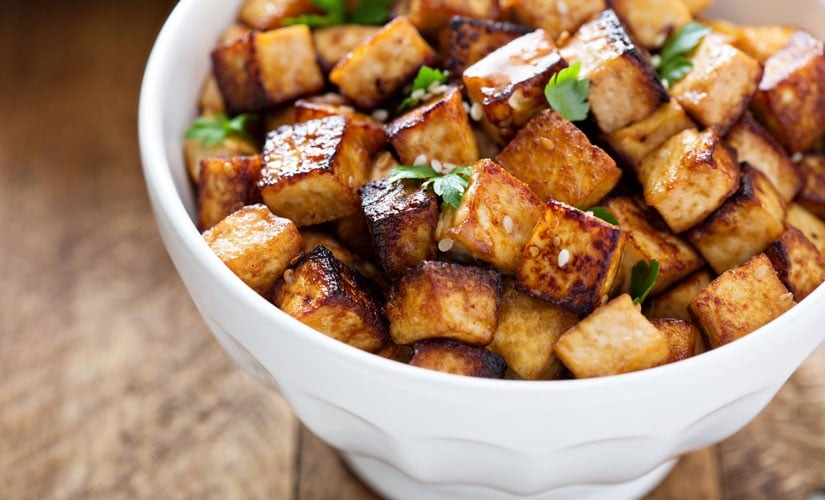
The most common question vegans get asked is “How will you get your protein?” The question that should be asked instead is: How much protein is “enough”?
In America, we know and love the benefits of a high protein diet. But it’s possible to have too much of a good thing – and it turns out Americans are eating twice as much protein as we need, thanks in part to our high meat consumption. And meat based protein can increase your chance of developing chronic diseases such as kidney, heart disease, diabetes, and cancer.
Still, Americans could be forgiven for this overemphasis on protein. Protein isn’t just an important building block of bones, muscles and cartilage – it’s also used to make enzymes and hormones, and the hemoglobin that carries oxygen in your blood. But there’s good news for vegans – A 2013 study of over 50,000 individuals by the Journal of the Academy of Nutrition and Dietetics showed that vegans, vegetarians, and flexitarians got 70% more protein versus their recommended intake, without the risks of meat based protein.
This may surprise readers, but it turns out that there are plant-based options that are packed with protein. A 130-pound woman needs about 47 grams of protein per day, and a 180-pound man needs about 65 grams per day.
To get adequate protein: Simply eat a balanced diet that includes whole grains, vegetables, legumes, fresh fruit, and nuts and seeds and eat enough calories to meet your energy needs. It’s that simple!
Here are a few examples of sources of protein in plants.
- Beans: 16-18 grams per 1 cup, cooked. High in fiber, and low in fat, beans are extremely heart healthy and help maintain a healthy weight.
- Soy: 20-30 grams per cup of tofu, edamame, tempeh, or natto. The firmer the tofu, the higher the protein content!
- Whole Grains (Oats, brown rice, and quinoa): 6-9 grams per cup, cooked. Quinoa is so healthy that NASA hopes to grow it on interplanetary space flights.
- Vegetables: Even a simple cup of spinach or broccoli can have over 5 grams of protein per cup.
Any doubts? Consider that some of the world’s largest animals get their protein only from plants, as they are vegetarian. Think elephants, giraffes, gorillas, hippos, horses, cows, etc. We could do just as well.
Incorporate these protein rich foods to your daily diet:
- Beans (black, pinto, kidney, garbanzo, cannellini, etc.)
- Lentils (brown, red, yellow)
- Dried peas (split green or yellow)
- Tofu
- Edamame
- Veggie meat substitutes
- Nuts and seeds (in moderation due to their high fat/calorie content)
- And all sorts of greens
For those looking to improve their health, try substituting a dish or two with a plant-based protein source – you’ll get more fiber, antioxidants, high nutrient profiles – even flavor.
At ‘Ekahi Ornish Lifestyle Medicine, our registered dietitians have helped hundreds of individuals live healthier, happier lives by modifying their eating habits. For more delicious plant-based recipes, check out our website at https://www.ekahiornish.com/ohana/browse-recipes/.
The ‘Ekahi Ornish Program was offered by ‘Ekahi Health—which provides comprehensive community-based care focusing on primary care and prevention and wellness. Learn more about the ‘Ekahi Wellness Program
Repurposed from “Where’s the Protein: How Vegans Get Enough” available in Ornish Living Magazine